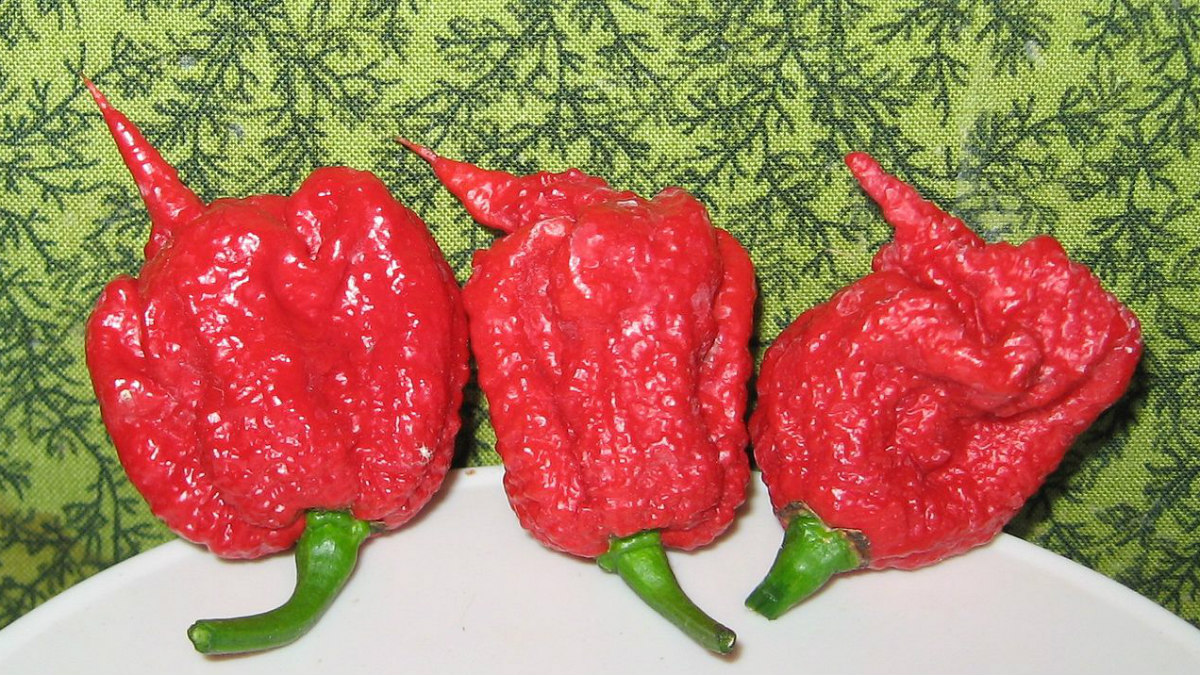Carolina Reaper: How hot is the latest chilli to go on sale?
Record-winning pepper too hot to touch with bare hands hits the UK supermarket shelves today

A free daily email with the biggest news stories of the day – and the best features from TheWeek.com
You are now subscribed
Your newsletter sign-up was successful
The Carolina Reaper chilli goes on sale in UK supermarkets today. It's being touted as not only the world's hottest chilli pepper – approved by the Guinness World Records committee – but also as a delicious addition to a curry. So how hot is it and could eating it be dangerous?
Where does the Carolina Reaper come from?
Although the chilli is named after the US state of South Carolina, where it was originally bred, the specimens you're likely to see on supermarket shelves were grown in the UK.
The Week
Escape your echo chamber. Get the facts behind the news, plus analysis from multiple perspectives.

Sign up for The Week's Free Newsletters
From our morning news briefing to a weekly Good News Newsletter, get the best of The Week delivered directly to your inbox.
From our morning news briefing to a weekly Good News Newsletter, get the best of The Week delivered directly to your inbox.
It was created by crossbreeding a ghost pepper, itself a former world record-holder for the hottest chilli, and a red habanero.
How hot is hot?
How about, too hot to touch with bare hands? Customers are warned to don gloves before handling the Carolina Reaper. The Guinness World Records committee rated the Reaper at 1.5 million Scoville units – the official measure of chilli strength. To put that in context, it is 428 times hotter than the humble jalapeno, which scores only 3,500 units.
However, the Reaper isn't just a challenge for spicy food addicts looking for a chance to show off. "Despite it being astonishingly hot, it also has a wonderful fruity taste," said Tesco chilli buyer Phoebe Burgess. "Only a sliver is needed to add exciting flavour to your favourite curry."
A free daily email with the biggest news stories of the day – and the best features from TheWeek.com
Is it dangerous to eat?
"Theoretically, one could eat enough really hot chillies to kill you," horticulture professor Paul Bosland told Live Science. "However, one's body would react sooner and not allow it to happen."
Tissue inflammation caused by capsaicin, the active ingredient in chillies, will cut short any chilli-eating binge before it proves fatal – although it could damage the stomach and intestines.
Even chillies that don't hold the world record for heat can pose a health risk, with sweating, vomiting and fainting all possibilities. Two contestants in a chilli-eating challenge at an Edinburgh curry house had to be taken to A&E in 2011, earning the restaurant owner a ticking off from the Scottish Ambulance Service.
-
 How the FCC’s ‘equal time’ rule works
How the FCC’s ‘equal time’ rule worksIn the Spotlight The law is at the heart of the Colbert-CBS conflict
-
 What is the endgame in the DHS shutdown?
What is the endgame in the DHS shutdown?Today’s Big Question Democrats want to rein in ICE’s immigration crackdown
-
 ‘Poor time management isn’t just an inconvenience’
‘Poor time management isn’t just an inconvenience’Instant Opinion Opinion, comment and editorials of the day
-
 Home Office worker accused of spiking mistress’s drink with abortion drug
Home Office worker accused of spiking mistress’s drink with abortion drugSpeed Read Darren Burke had failed to convince his girlfriend to terminate pregnancy
-
 In hock to Moscow: exploring Germany’s woeful energy policy
In hock to Moscow: exploring Germany’s woeful energy policySpeed Read Don’t expect Berlin to wean itself off Russian gas any time soon
-
 Were Covid restrictions dropped too soon?
Were Covid restrictions dropped too soon?Speed Read ‘Living with Covid’ is already proving problematic – just look at the travel chaos this week
-
 Inclusive Britain: a new strategy for tackling racism in the UK
Inclusive Britain: a new strategy for tackling racism in the UKSpeed Read Government has revealed action plan setting out 74 steps that ministers will take
-
 Sandy Hook families vs. Remington: a small victory over the gunmakers
Sandy Hook families vs. Remington: a small victory over the gunmakersSpeed Read Last week the families settled a lawsuit for $73m against the manufacturer
-
 Farmers vs. walkers: the battle over ‘Britain’s green and pleasant land’
Farmers vs. walkers: the battle over ‘Britain’s green and pleasant land’Speed Read Updated Countryside Code tells farmers: ‘be nice, say hello, share the space’
-
 Motherhood: why are we putting it off?
Motherhood: why are we putting it off?Speed Read Stats show around 50% of women in England and Wales now don’t have children by 30
-
 Anti-Semitism in America: a case of double standards?
Anti-Semitism in America: a case of double standards?Speed Read Officials were strikingly reluctant to link Texas synagogue attack to anti-Semitism